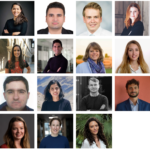All aspects of life have been impacted by digital technologies, and the speed of disruption has meant many organisations are needing to rethink how they develop, exploit and take to market new technologies and services. A new training network aims to develop a new generation of researchers with skills in innovation and technology management for the digital age.
EINST4INE supporting digital transformation
Challenges of the digital revolution include: how best to integrate the digital and real worlds, how to restructure processes to respond effectively to the new dynamics of online commerce, how to use the wealth of information now available to improve strategic decision making.
To assist organisations in answering these issues and more, a new training network has been established with funding from the European Union. It is looking at the impact of digitisation on the Innovation Ecosystem and the tools and techniques that organisations need to embrace in order to compete effectively on this new playing field.
The network is called EINST4INE (the European Training Network for InduStry Digital Transformation across Innovation Ecosystems) and aims to develop researchers with the necessary skills to examine the digital transformation of society and industry from different perspectives.
It has recruited 15 early-stage researchers, across 15 research projects to develop new skills in innovation and technology management.

EINST4INE has three strategic objectives
Digital transformation – to develop a knowledge-base of new ways of working in the digital world.
Industry 4.0 – to investigate the tools, methods and organisational structures needed for strategic decision making.
Innovation ecosystems – to examine how to capture value from technology enabled ecosystems.
Early Stage Research Projects
EINST4INE will examine human-machine interaction by looking at collaborative robots (cobots) and their relationship with humans in the workplace. In particular, how they can facilitate and enable humans to reach their full capacity and how to manage these interactions. It will also look at how digital tools and methods, such as augmented reality, can support strategic decision-making, and investigate how technology can be used to facilitate innovation ecosystems.
The researchers are hosted by: Aarhus University, Denmark; University of Cambridge, UK; Lappeenranta-Lahti University of Technology LUT, Finland; Libera Universita Internazionale degli Studi Socialis Guido Carli, Italy; RMIT Europe, Spain; Scuola Superiore Sant’Anna Italy; University of Stuttgart, Germany.
The projects are:
- Project 1: Future skills and competencies of employees dealing with the management of digital transformation
- Project 2: Assessment of human-machine interfaces of social and collaborative robots
- Project 3: Human models for collaborative robots
- Project 4: The robo-advisor revolution and its impact on skillset and competencies of financial advisors
- Project 5: Embodied presence of remote employees in collaborative teams: The use of mobile telepresence robots
- Project 6: Integration of virtual or augmented reality tools with human decision-making approaches for technology strategy
- Project 7: Integration of ‘digitally-’ and ‘socially-’ driven decision-making approaches in contemporary industries
- Project 8: Organisational capabilities, processes and structures that support and drive digital transformation
- Project 9: The technological and industrial convergence and the interplay between technology-centred ecosystems
- Project 10: The technologies that generate innovation ecosystems
- Project 11: Industry 4.0 as an enabler of innovation ecosystem emergence
- Project 12: Non-platform-based innovation ecosystem emergence
- Project 13: Innovation ecosystem orchestration mechanisms
- Project 14: Legitimising innovation ecosystem orchestration
- Project 15: Linking open innovation mechanisms for environmental sustainably goals

